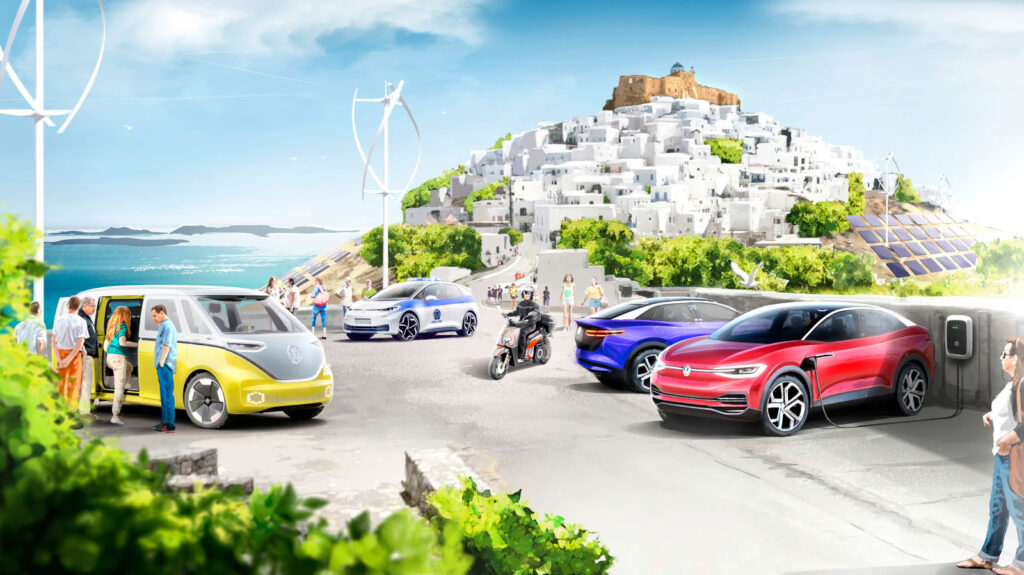Volkswagen Group Taps into New Profit Pools with Sustainable Mobility

- Group makes decisive progress in its four industry-leading technology platforms and further expands sustainable mobility business
- Architecture: The Group will introduce the latest generation of e-mobility platforms with the new Premium Platform Electric (PPE) from 2024; this will be followed in 2025 by the improved Modular Electric Drive Matrix MEB+ with longer range, shorter charging times and new models with entry-level prices below 25,000 Euro
- Battery & Charging: Well-advanced discussions with Mahindra on the use of central MEB components such as e-drive and unified cell; unified cell, standardized cell factory and other innovations bring significant cost advantages and enable democratization of e-mobility
- Software: Audi Q6 e-tron gives first preview of new software generation E 1.2; Software Defined Vehicle Hub to start soon and drive development of future software architecture E 2.0
- Mobility: stake in Pon subsidiary in bike leasing taps booming global B2B profit pool; Group mobility platform to be rolled out after successful pilot phase, covering all mobility needs
The Volkswagen Group has made decisive progress in its four industry-leading technology platforms. It is also tapping into highly attractive additional profit pools as part of its transformation from legacy automaker to integrated mobility provider by further expanding its sustainable mobility business.
At the Group’s press conference at IAA Mobility in Munich, CEO Oliver Blume said:
“We are making good progress. And faster than planned. We have reached numerous milestones, set important strategic directions and achieved joint successes. We are systematically driving forward the transformation along our ten-point plan and consistently developing further attractive profit pools in the area of sustainable mobility.”
As a strategic framework, the ten-point plan defines the most important fields of action for the Group’s transformation. The company’s four technology platforms play an integral role here: architecture, battery & charging, software and mobility. The Group has made decisive progress in each of these areas, which it is presenting at IAA Mobility.
Architectures are and remain an integral part of the Group’s DNA
Expertise in this area sets the Group apart from the industry mainstream and gives it a competitive advantage and significant scaling potential across its ten strong core brands. Since 2012, around 45 million vehicles have been produced on the successful Modular Transverse Toolkit (MQB). With the Modular Electric Drive Matrix (MEB), the company was one of the first to transition its platform strategy into the electric age. Since 2020, more than 1.1 million fully electric vehicles have been delivered by five Group brands on the MEB platform.
The Group is continuously improving this platform and offering more performance and functionality in all customer-relevant areas to meet the rapidly advancing development in sustainable all-electric mobility. This is demonstrated by new models such as the Volkswagen ID.7 with a range of up to 700 kilometers. From 2025, the enhanced MEB+ platform will be launched with a further increase in range and efficiency of around 10 percent. It offers acceleration times of less than 5 seconds from 0 to 100 km/h and fast charging of less than 20 minutes based on the Group’s unified cell with Cell2Pack technology. New all-electric models from Volkswagen, SKODA and CUPRA with entry-level prices below 25,000 Euro will make e-mobility accessible to even more customers. Simultaneously, they will be the first vehicles to use MEB+. Just how emotional this segment can be is demonstrated by the concept vehicle presented at IAA Mobility, the Volkswagen ID. GTI Concept.
One year earlier, in 2024, the Group’s second electric platform will be launched: the Premium Platform Electric (PPE). Jointly developed by Audi and Porsche, the platform features a powerful and efficient electric drivetrain with a range of over 600 kilometers, as well as innovative battery and charging management with 800-volt technology. The Audi Q6 e-tron will be the brand’s first vehicle on the PPE and marks the next major step in the electrification of the model range. In addition, the PPE models will receive a high-performance electronics architecture and software platform newly developed by CARIAD, through which the vehicle will be seamlessly embedded in the customer’s digital ecosystem. Digitalization thus becomes more tangible than ever before. Among other things, customers can install and use some of their favorite apps from the integrated application store directly in the vehicle. The Audi Q6 e-tron is also the brand’s first model to offer the new, free-standing MMI panoramic display in curved design, a new augmented reality head-up display and a passenger display.
In the medium term, the Volkswagen Group will switch to the Scalable Systems Platform (SSP) as a single future backbone with integrated electric and electronics architecture. This creates enormous standardization and scaling potential, as more than 40 million vehicles across all brands and segments are to be built on the SSP. At the same time, the intelligent platform concept provides the flexibility to tailor vehicles to the needs of each segment while ensuring the necessary differentiation between brands. Investment and R&D costs are expected to be reduced by around 30 percent on SSP compared to MEB, enabling most all-electric models to achieve the same margin compared to their conventionally powered counterparts.
Battery & charging as key to affordable and profitable e-mobility
With Ford already opting for the MEB, the Volkswagen Group is now in well advanced talks with Mahindra as another important cooperation partner. Mahindra wants to use key MEB components such as the e-drive and the unified cells for its models.
Related Article: Volkswagen to Showcase Diverse Product Portfolio and Commitment to Corporate Responsibility at IAA MOBILITY 2023
Unlike many competitors, the Group is integrating the development and production of battery cells into its value chain with PowerCo. The aim is to keep a significant part of the value creation of a fully electric vehicle within the company. Low battery costs are also an essential prerequisite for democratizing e-mobility. Key levers for reducing battery costs by up to 50 percent compared to the first generation MEB are the unified cell developed by PowerCo, the standardized cell factory, and other innovations such as dry coating and low-cost cell chemistry without cobalt and nickel. This makes e-mobility affordable for broader segments of the population and even more sustainable.
Software Defined Vehicle Hub will drive the development of the next software architecture
The Group is systematically expanding its software expertise as a key driver for future success. The goal is to be a leader in user experience and to delight customers worldwide. To be successful in this area, the company relies on three core elements: focused development, strategic partnerships, and efficient licensing.
The presentation of the interior of the Audi Q6 e-tron at IAA Mobility provides a glimpse of the new E 1.2 software generation.
For the future E 2.0 software architecture, CARIAD will accelerate the entire development process by streamlining the project organization and reducing complexity through simpler processes and clear responsibilities. To this end, the Software Defined Vehicle Hub (SDV) will soon be launched. There, employees from CARIAD, Volkswagen and Audi will jointly develop vehicles in a completely software-centric way.
Mobility solutions expanded through stake in Pon subsidiary in the area of bicycle leasing
One important proof point of the Group’s transformation into an integrated provider of sustainable mobility is the planned investment by Volkswagen Financial Services in Bike Mobility Services (BMS), a subsidiary of Pon from the Netherlands, a long-standing partner and the world’s largest bicycle manufacturer. BMS includes well-known brands as Business Bike, Lease A Bike and B2Bike. This market is booming, as many companies are expanding mobility services for their employees to include bicycles as an extension of their traditional fleet business. The Group aims to significantly expand its bike leasing business worldwide as an additional profit pool, with a focus on Europe and the USA. The goal is to become Europe’s largest manufacturer-owned two-wheeler financier. This will enable the Group to take advantage of the trend toward sustainable micromobility and to gain new customer segments.
Another core element in this area is the new mobility platform being set up together with Europcar. It will cover all mobility needs, from hourly rental offers to leasing for several years. In addition, it will conveniently bundle third-party services such as e-scooters and public transportation in one app, even for shorter usage times of just a few minutes. Following a successful pilot project in Vienna, the platform is now to be rolled out successively in Germany and Europe. The Group is thus tapping into a fast-growing profit pool with an expected global market size of around 100 billion Euro in 2030.












